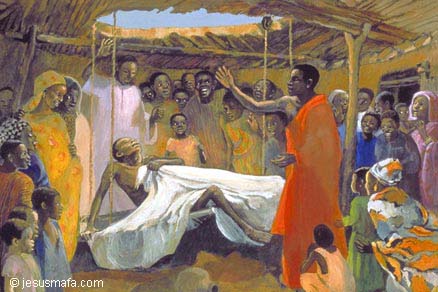 Source: Musings about faith
Source: Musings about faith But what is happening now? The government has a private-modeled government health insurance called NHIF. The problem with reducing government involvement in healthcare to money is that it makes private healthcare practitioners greedy and beyond oversight. It has therefore meant that the government has been bleeding taxpayer funds through fraudulent claims by private hospitals. In the end, NHIF has now pulled out of funding major care, surgeries and tests. When we initially said that NHIF was not sustainable, salaried Kenyans pointed to how nice NHIF was to pay their bills and wouldn't believe us. Our prediction has, unfortunately, come to pass.
But if we had specialized care in government hospitals, government can negotiate lower prices for drugs and machines (if there is no corruption), meaning that the cost is cheaper.
But the worst part of this story is that while our focus is on elections, the government, with international fisis, is deliberately destroying public healthcare through a series of measures: 1) frustrating public healthcare professionals through poor pay and poor equipment 2) allowing healthcare investments with no public oversight 3) treating healthcare as a commodity for sale rather than a service. The current government, for example, has allowed foreign investors to buy huge chunks of local hospitals, and has a policy of turning healthcare into a tourism product.
The silence of the Church
Unfortunately, the church has failed to understand this larger principle and has opted to complement government services by building its own hospitals. While the church is welcome to provide healthcare, this is not a sustainable policy for the entire country. At the end of the day, Caesar always has more resources than the church to provide healthcare. It is therefore an over-reach, if not outright folly, for NCCK, for example, to claim that it is planning to provide "affordable healthcare across the country." And this desire of the older churches to be a complementary government is rooted in colonial patriarchy, in which missionary hospitals were providing healthcare to convert Africans while colonial governments colonized them.
Other churches opt to help members raise money or to hold brief and free medical camps. Others, on the other hand, opt for miracle services and blaming people who do not get well for not having enough faith.
But there is one thing the church has not done, and which would be the most important contribution of all: the church can speak with one voice about the suffering of God's people from diseases that can be treated if the government used our resources properly. It can prophecy against the rabid privatization of Kenyan healthcare by foreign companies, which is a direct contradiction to our independence and desire for self-governance as God's children in Kenya.
I urge all Christian Kenyans to say to their churches: what we need most of all from the church is not miracles. It is not fundraising. It is the church's collective voice. The prophets of old changed the destiny of their nations by speaking God's word, not by charity or philanthropy. We therefore want to hear the church make a collective call on behalf of God's children against the privatization and commercialization of healthcare.
To stir the church out of silence, I have suggested that we promise our churches that our tithes will go to medical appeals rather than to the church, since the tithes are for ministry which the church is evidently not performing. After all, we are a country where the suffering of Kenyans no longer speaks as loud as money does. Maybe the church has also become too Kenyan to be Christian, so we need to hit where the church will hurt most - at the purse strings. In any case, we would be doing what the Good Samaritan did, which was to commit resources to the care of the traveler until the traveler recovered from his injuries.
 RSS Feed
RSS Feed
